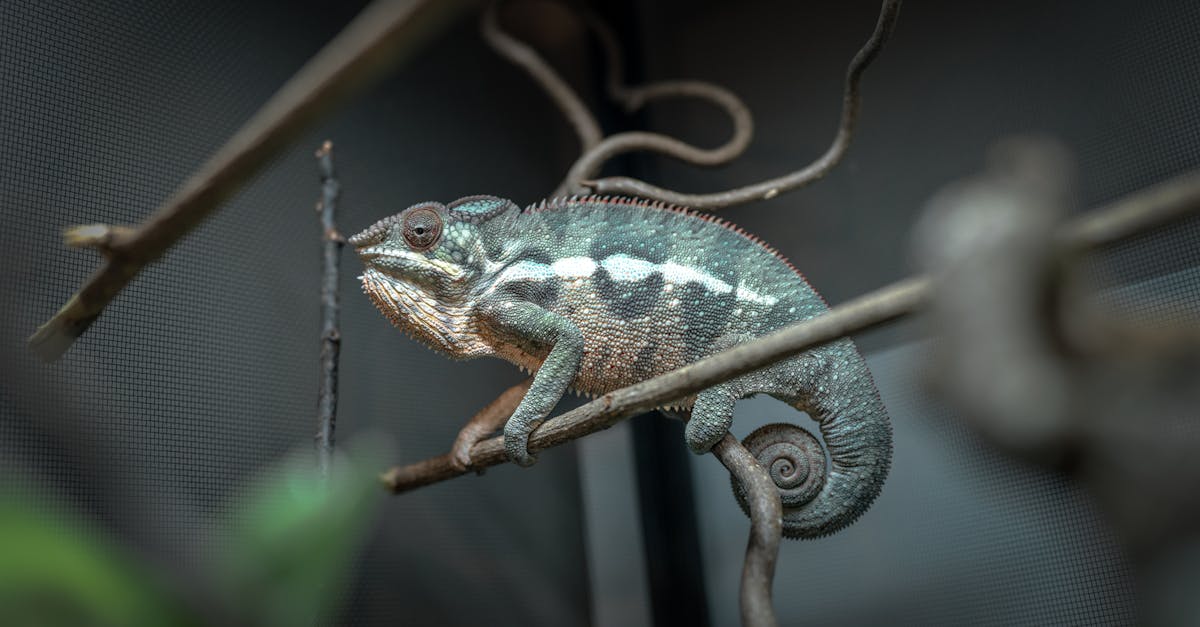Panther chameleons are undeniably stunning creatures with their vibrant colors and mesmerizing ability to change hues. It’s no wonder they capture the interest of exotic pet enthusiasts. But before you decide to bring one of these fascinating reptiles into your home, it’s important to understand their unique needs and whether they’re a good fit for you as a pet owner.
🩺 Vet Recommendations
As a veterinarian, I often remind potential exotic pet owners that keeping a panther chameleon is not the same as owning a cat or dog. These reptiles are highly sensitive and require precise care to thrive. While they can make rewarding pets for the right owner, they are not ideal for everyone.
Here are a few things to consider before bringing a panther chameleon into your home:
- They require a carefully maintained environment with specific temperature, humidity, and lighting conditions.
- Panther chameleons are solitary creatures and can become stressed if handled frequently or housed with other chameleons.
- Their diet consists primarily of live insects, which means you’ll need to manage a supply of crickets, roaches, or other feeder insects.
Owning a panther chameleon can be a fulfilling experience, but it demands commitment, knowledge, and proper planning.
📋 Care Tips
Panther chameleons have specialized needs that require careful attention. Here’s a breakdown of their essential care requirements:
- Housing: They need a well-ventilated enclosure, ideally a screen cage, to ensure proper airflow. The enclosure should be tall rather than wide, as chameleons love to climb.
- Lighting: UVB lighting is crucial for their health as it helps them synthesize vitamin D3, which is necessary for calcium absorption.
- Temperature: Maintain a temperature gradient within the enclosure. The basking area should be around 85–95°F, while the rest of the enclosure should stay between 75–80°F.
- Humidity: Keep humidity levels between 50% and 70%. Regular misting or an automatic misting system can help maintain these levels.
- Diet: Feed them a variety of gut-loaded insects such as crickets, roaches, and mealworms. Dust the insects with calcium and vitamin supplements to prevent nutritional deficiencies.
- Hydration: Panther chameleons typically drink water droplets from leaves, so a dripping system or misting is essential.
Setting up and maintaining the right environment is critical to keeping your chameleon healthy and stress-free.
✅ Do’s and Don’ts
Here are some key points to keep in mind when caring for a panther chameleon:
- Do: Research thoroughly before getting a panther chameleon to ensure you understand their needs.
- Do: Handle your chameleon minimally, as they are easily stressed by excessive interaction.
- Do: Monitor their health regularly for signs of illness, such as loss of appetite, lethargy, or changes in coloration.
- Don’t: House multiple chameleons together—they are solitary animals and may fight or become stressed.
- Don’t: Use compact enclosures or glass tanks with poor ventilation, as this can lead to respiratory problems.
- Don’t: Skip UVB lighting or calcium supplementation, as these are essential for preventing metabolic bone disease.
By following these do’s and don’ts, you can help your chameleon thrive in captivity and live a healthier life.
💡 Expert Advice
Panther chameleons are a joy to observe and care for if you’re prepared for the responsibility they entail. They are best suited for experienced reptile owners or individuals willing to invest time in learning about their care. If you’re new to reptile ownership, consider starting with a less demanding species before transitioning to a panther chameleon.
If you’re ever unsure about your chameleon’s health or care, consult a veterinarian with experience in exotic pets. Early intervention can make a significant difference in treating illnesses or adjusting care routines to better suit your pet’s needs.
According to VCA Animal Hospitals, common health issues in chameleons include dehydration, metabolic bone disease, and respiratory infections (source).
FAQs
Q: Are panther chameleons good pets for beginners?
A: Panther chameleons are not typically recommended for beginners due to their complex care requirements. However, with proper research and preparation, a dedicated beginner could successfully care for one.
Q: How long do panther chameleons live in captivity?
A: With proper care, panther chameleons can live between 5–7 years in captivity. Males tend to live slightly longer than females.
Q: What should I do if my panther chameleon stops eating?
A: Loss of appetite can be a sign of stress, illness, or improper environmental conditions. Check your setup and consult a vet experienced in reptiles for advice.
Book a $49 online vet consultation at https://www.dialavet.com for fast, expert advice.























